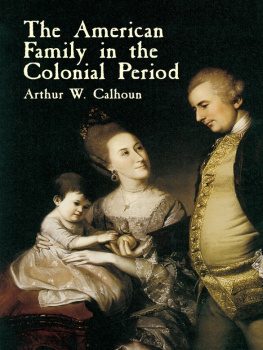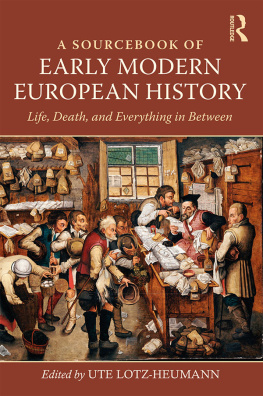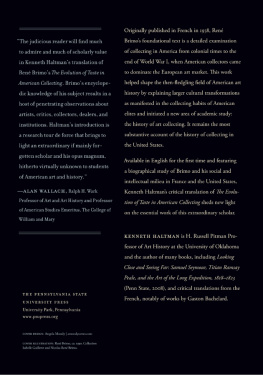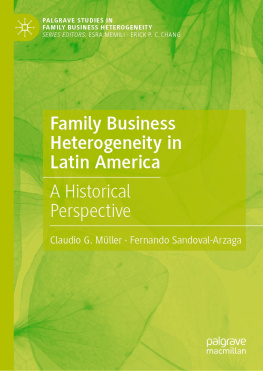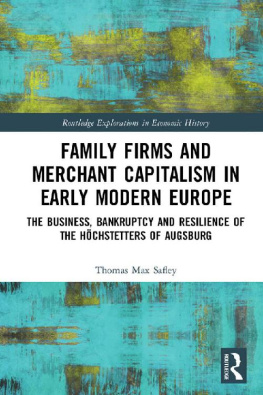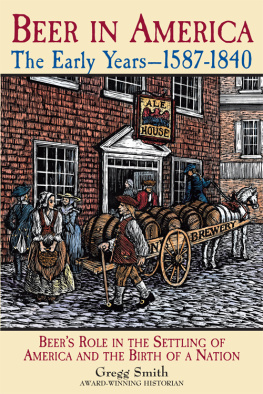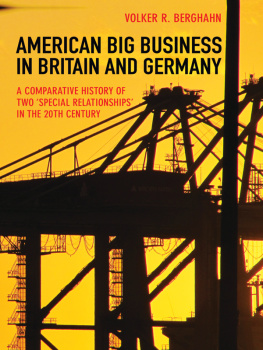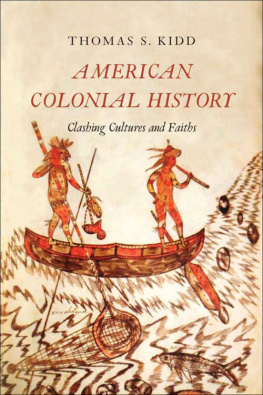Bibliographical Note
This Dover edition, first published in 2004, is an unabridged republication of the work originally published in 1917 by the Arthur H. Clark Company, Cleveland (Ohio), under the title A Social History of the American Family, Vol. I: Colonial Period.
Library of Congress Cataloging-in-Publication Data
Calhoun, Arthur W (Arthur Wallace), 18851979.
[Social history of the American family from colonial times to the present. 1, Colonial period]
The American family in the colonial period / Arthur W. Calhoun. p. cm.
An unabridged republication of the work originally published in 1917 by the Arthur H. Clark Company, Cleveland (Ohio), under the title A social history of the American family, vol. I: Colonial periodVerso t.p.
Includes bibliographical references.
9780486143309
1. FamilyUnited StatesHistory. 2. WomenUnited StatesHistory. 3. United StatesSocial life and customs17th century. 4. United StatesSocial life and customs18th century. 5. United StatesSocial conditions17th century. 6. United StatesSocial conditions18th century. I. Title.
HQ535.C23 2004
306.850973dc22
2004043838
Manufactured in the United States of America
Dover Publications, Inc., 31 East 2nd Street, Mineola, N.Y. 11501
43366802
PREFACE
The three volumes of which this is the first are an attempt to develop an understanding of the forces that have been operative in the evolution of family institutions in the United States. They set forth the nature of the influences that have shaped marriage, controlled fecundity, determined the respective status of father, mother, child, attached relative, and servant, influenced sexual morality, and governed the function of the family as an educational, economic, moral, and spiritual institution as also its relation to state, industry, and society in general in the matter of social control. The work is primarily a contribution to genetic sociology.
Not until such an investigation as lies back of these volumes has been undertaken is it possible to realize the absolute dearth of connected and systematic material on the general history of the American family as a social institution in relation to other social institutions and to the social forces. In this as in so many other vital fields of human interest and action, everything has hitherto been taken for granted. In view, therefore, of the increasing attention given in recent years to the problems of the modern family, such as conditions of marriage, the birth-rate, the waning of home activities, the insurgency of the child, the economic independence of woman, sexual morality, divorce, and general family instability, it seems that the main lines of family evolution in the United States should be made accessible not merely to the professional student of sociology but also to the thinking public. The present work is in answer to that realized need.
The first volume of the series covers the colonial period and sets forth the germination of the American family as a product of European folkways, of the economic transition to modern capitalism, and of the distinctive environment of a virgin continent. Usages imported from Europe are detailed and their gradual modification or overthrow under the influence of economic progress and the sway of the wilderness is exhibited. Variations between the geographical sections are traced to mesological and population differences but the general similarity of North and South is affirmed as a preliminary to the study of their divergence in the national period. In general, the colonial family is presented as a property institution dominated by middle class standards, and operating as an agency of social control in the midst of a social order governed by the interests of a forceful aristocracy which shaped religion, education, politics, and all else to its own profit. The characteristics of the family in the English colonies receive accentuation from a brief view of the French settlements by the Gulf.
In the second volume, the period from Independence through the Civil War is covered under five main heads: the influence of pioneering and the frontier, the rise of urban industrialism, the growth of luxury and extravagance, the culmination of the regime of slavery, and the consequences of the Civil War. Cleavages between East and West and between North and South are made manifest in this volume and the interaction of their several influences is noted. It is also made evident that all the alarming problems that to-day portend family disintegration or perversion were present in some degree in ante-bellum days and were even dwelt upon with alarm.
The third volume analyzes the factors that have consummated the revolution of the family during the past fifty years. Stress is laid on the advance of industrialism, urban concentration, the growth of the larger capitalism, the immigrant invasion, the passing of the frontier, the intensification of the struggle for the standard of living, the movements of rebellion and revolution represented by such manifestations as feminism and socialism, the development of volitional control of family evolution, and the outlook for a democratic future. At no previous point save in the last stages of chatteldom in the South does the economic factor extrude so overwhelmingly.
In common with the best recent historical works, due place has been given to the Economic Interpretation, but with studied avoidance of fantastic exaggeration. The true claims of the dispassionate historical spirit have been held steadily in view. If it seem to the reader that undue attention has been given to pathological abnormalities, he should bear in mind that the American history with which most readers are familiar has been written by litterateurs or historians with little perspective save that which inheres in loyalty to the established order, in the attenuated atmosphere of the middle class, or in the desire to glorify the past, it may be of New England with its ancestral worthies, or of some other section in the romantic days. Those trained in the literature of such shallow schools naturally find it hard to put aside prepossessions and to refrain from confounding the disclosures of science with the product of the muck-raker.
Years of research, analysis, and rumination have gone into the preparation of these volumes. Exhaustive investigation of source writings and secondary works together with painstaking reconstruction and interpretation of the course of events warrant the assurance that the present work is the most complete, fundamental, and authoritative treatment of the field that it covers. It is given to the public in the hope that it will call forth a vital interest in the further development of this aspect of our social history.
To William E. Zeuch, of Clark University, I am indebted for valued assistance. I also acknowledge special indebtedness to the libraries of the State Historical Society of Wisconsin, the University of Wisconsin, and the University of Tennessee for access to the principal sources of my material, and to my wife for assistance and inspiration in the progress of the manuscript. I shall also be under obligation to such critics of the work as shall point the way to intrinsic improvement in the presentation of so momentous a theme.
ARTHUR WALLACE CALHOUN.
Clark University, November, 1916

